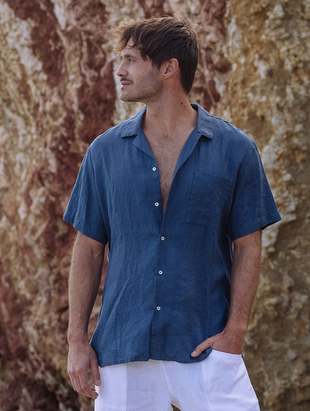Wabi-Sabi Crush: Interview with Ceramist Sage Cortez
Last week we told you about wabi-sabi, the Japanese concept that encourages us to embrace life's imperfections, be content with what we have, and appreciate things that have withstood the test of time. In home decor, wabi-sabi manifests itself through natural materials and handmade items.
To give you a more in-depth look into this philosophy, we wanted to introduce you to someone who's fully embraced wabi-sabi in their life and work. Thus, meet Sage Cortez, an Oregon-based designer, ceramist, and self-proclaimed handbuilder behind the minimalist ceramics brand Hand & Fire.
"I am a potter attempting to perfect qualities of the hand within functional tableware. Hand & Fire pots are meant to be a refresher in a world of largely untouched, symmetrical, and casted goods. My ultimate goal is to speak of material, technique and most of all, the makers attached to their products," Sage explains.
Sage started working with clay in high school and moved on to study ceramics, which got her totally hooked on the craft and eventually led to developing her own practice. The artist tells us the first thing she's made and was proud of is a pour-over coffee pot that she still uses to this day: "It's made me countless cups of coffee in all its wonky glory."

Sage's work is heavily influenced by the principles of minimalism and wabi-sabi. She acquainted this philosophy in art school through literature such as The Unknown Craftsman by Soetsu Yanagi adapted by Bernard Leach, and Wabi-Sabi for Artists, Designers, Poets, & Philosophers by Leonard Koren.
"We discussed principles of making in such a way that defies traditional values of beauty and points at functionality, imperfections, incompleteness and so on. I was immediately fascinated by this frame of thought," Sage says. Here, she tells us more about her experience with wabi-sabi.
ML: Hi, Sage! Can you describe wabi-sabi in your own words?
S: Honesty, truthful making, and skill in allowing imperfections to be a part of the piece. It’s something I strive for every day I’m in the studio and something I will strive for throughout my career.
ML: How do you apply wabi-sabi principles in your work?
S: My approach to applying the principles of wabi-sabi is through the materiality of clay, the movements of my hands, and the use of my tools. Oftentimes, makers attempt to defy the material they are working with. I had fallen for this many times as well. But once I started approaching the material as just that — a material — I felt that leaving creases, folds, brush strokes, fingerprints and tool marks was all inherent and truthful to my creations.

Kang-Hyo Lee, a Korean Onggi potter, speaks of making honest pots — ones that reflect the life of clay and the maker coming together to create. My values are highly reflective of this philosophy as I want my pots to speak of their process as well as my own.
ML: Do you apply wabi-sabi principles in your personal life?
S: Absolutely. From how I choose to bring new items into my life to how I approach relationships. I believe wabi-sabi can be applied to any situation through honesty, appreciation, and thoughtful evaluation. It’s hard to do sometimes, I admit, but it’s a good way of living.
ML: How would you advise people to incorporate wabi-sabi in their own lives?
S: Live in the moment. Accept failure as a fresh slate to start over and try again. Be kind and forgiving to yourself and others on this journey. Work towards your goals and forge your own paths. Be honest in all frames of the word and realize how important it is to be true to ourselves.
 United States
United States













